#呪怨
Explore tagged Tumblr posts
Text
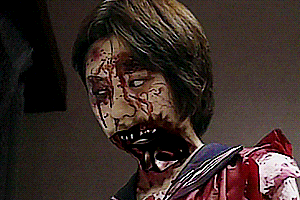

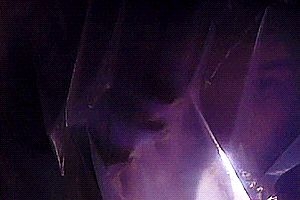
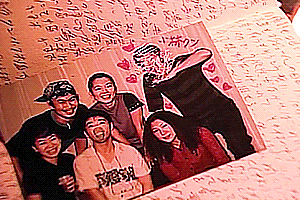




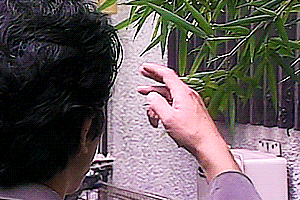

Ju-On: The Curse (2000)
#ju-on#ju-on: the curse#ju-on the curse#the curse#呪怨#horroredit#horroredits#movieedit#movieedits#filmedit#filmedits#kayako saeki#toshio saeki#my gifs#edit
176 notes
·
View notes
Text


Ju-on: The Grudge (2002) Directed by Takashi Shimizu
5 notes
·
View notes
Photo










Ju-on Takashi Shimizu Japan, 2000 ★★ Hey look, it's Takako Chigusa!!
15 notes
·
View notes
Video
youtube
Ju-on: Rancore (呪怨) Wii Longplay [HD]
0 notes
Text
the true horror in The Grudge is the patriarchy
in this essay I will
1 note
·
View note
Photo





Ju-On: Black Ghost
134 notes
·
View notes
Text
何かやって「悪気はない」ほど恐ろしいことはない場合がある。 それを「当然」「大前提」と考えているということだから。 知的でない(客観視しない)人の恐ろしさ。 悪気なく哺乳類の死体を「当然」としか思わず100%快適にニコニコ食べている人間はみんな恐ろしい。 自分の凶悪さ劣悪さに気付けない知性ほど恐ろしいものはないという場合がる。 「あどけない笑顔」が一番恐ろしいという場合がある。 そのことに気付かされてキレる大人がもしいたら、これから大幅に遅れて中二病をやり始めるレベルなのかもしれない。 大金を持った中二病は恐ろしい。 そういう災い���元にはなるべく近づかない方がいい。
3 notes
·
View notes
Text







𝔗𝔥𝔦𝔯𝔱𝔶-𝔒𝔫𝔢 𝔇𝔞𝔶𝔰 𝔬𝔣 ℌ𝔬𝔯𝔯𝔬𝔯 𝟸𝟶𝟸𝟺
The curse of one who dies in the grip of a powerful rage. It gathers in that place of death. Those who encounter it will be consumed by its fury.
呪怨 Ju-On: The Grudge (2002) dir. Shimizu Takashi
#ju on#ju on: the grudge#horroredit#filmedit#31 days of horror#flashing lights#eye strain#blood cw#forfive#uservix#userspicy#sandushengshou#*31doh24
162 notes
·
View notes
Text

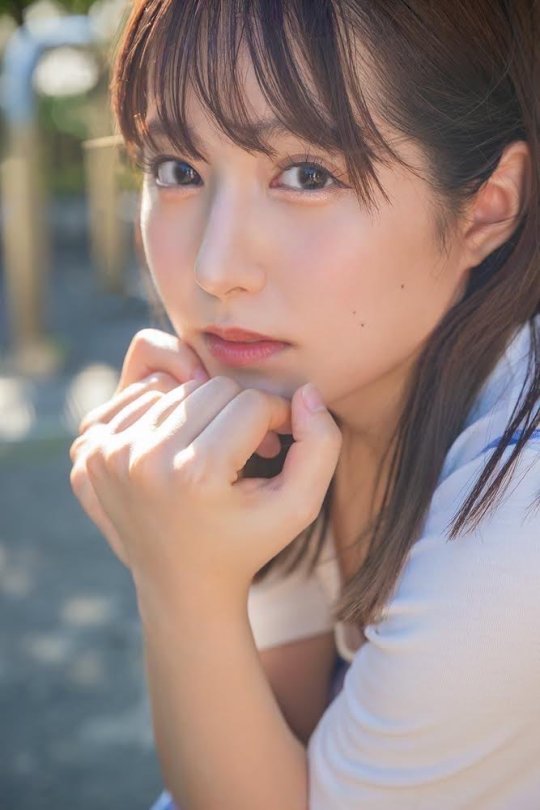
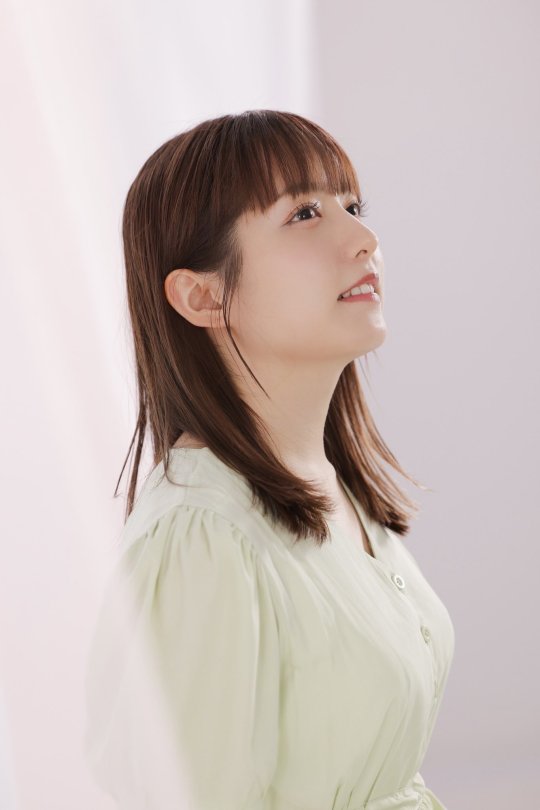
前田 美里は、日本のAV女優、グラビアアイドル、女優。フリーランス。東京都出身。 ウィキペディア
別名義 矢埜愛茉
生年月日: 1996年2月13日 (年齢 27歳)
出生地: 東京都
映画: 呪ギャル ~芸能怨霊伝説~、 デッドクック、 超鬼やば!
身長: 146 cm
カップサイズ: D
スリーサイズ: 83 - 61 - 85 cm
デビュー: 2011年
213 notes
·
View notes
Text







Ju-on: The Curse (2000) Directed by Takashi Shimizu
3 notes
·
View notes
Quote
竹中平蔵が元気に生きているのをみると「ああ、怨霊も呪いも本当にないんだなあ」と実感する
[B! トンデモ] 竹中平蔵「日本人の生活はそんなに苦しくなってないのに騒ぎすぎ。もっと頑張れ」岸田減税は何の意味もないと断言…「社会安定のため国民に施し(給付)を」(みんかぶマガジン) - Yahoo!ニュース
209 notes
·
View notes
Text
i fell into a little rabbit hole while reading bora chung's cursed bunny when i found the japanese proverb 「人ひとを呪のろわば穴あな二ふたつ」 ("hito o norowaba ana futatsu"), meaning "when you curse a man, [you dig] two graves" (click here for reference and click on the first link at the bottom for more context). it's a cautionary proverb about the consequences of cursing or invoking evil onto others, similar in a way to the english proverb "what goes around comes around."
i dug around some more (hah!) and found an article explaining the origins of the proverb (click on the second link at the bottom). do bear with my lacking skills when it comes to translating, but from what i understand, the proverb itself originated from the heian period. onmyoji (click on the third link at the bottom) were civil servants who practiced onmyodo, specializing in magic and divination. the article describes them using the kanji 呪術師 (third highlight in the left image), or jujutsushi, meaning sorcerer.

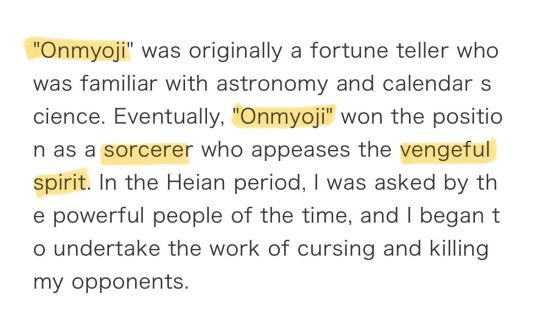
these onmyoji were responsible for calendar-related tasks and mystical duties such as divination, but the most interesting duty listed was protecting the capital from evil spirits, or 怨霊を (vengeful spirit) as the article cites, by cursing and killing the capital's opponents. now, this was a particularly dangerous task because they risked having that curse "returned" back to them in a counter-attack, killing them in the process, too—hence why one must prepare two graves when one resorts to "cursing" someone.
now that we've established the history of the proverb, it initially struck me as familiar because...
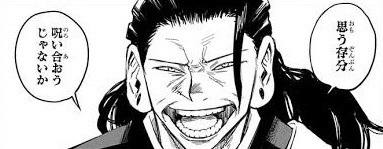

it's something geto mentioned when he came to the school to declare war! and...


later on when he says his last words to gojo!
given that the series takes some inspiration from onmyodo in the heian period (the golden age of jujutsu in the story), it's befitting that a proverb like this would make an appearance in the actual dialogue. in both instances, the proverb was relevant in geto's dialogue.
the article i referred to before also provided two example sentences related to the proverb, which when translated become:
"As there is a saying that if you curse people, there are two graves, hatred only produces unhappiness."
"I hate him so much. Even if you say that if you curse people, you will have two graves, I'm prepared for that."
as the geto fanatic that i am i find it interesting that both these phrases could align with geto's lines in volume 0. the first time geto references this proverb, it's when he says, "let's curse each other to our hearts' content." i've talked about this in my other posts (click here for one of them), that i've always believed that geto knew his pursuit of ideal was futile, or "impossible" as he explained to gojo in shinjuku. regardless of the outcome, this was the path he chose for himself, a path where he had to constantly pretend to the people around him that it was indeed possible.
referring to the proverb, the two graves here would be geto and the subject of his curse, non-sorcerers. his curse—his hatred—only led to his own unhappiness and his own demise. as it is, he failed his attack and the only grave there was his. he died unable to laugh from the bottom of his heart.
the second time geto references this proverb, it's when he says, "at least curse at me a little at the very end." he says this in an easy exasperation in response to gojo's omitted last words to him. he expects gojo to hate him or at least be angry with him, but instead gojo does not "curse" him the way he thought he'd be.
refering to the proverb, geto expects gojo to hate him so much, he'd curse him even if it might risk his own life to see geto dead. instead, gojo spares him—or rather, gojo says what he says honestly, without the disguise of anger or spite. the two graves here, at least in geto's mind, would be gojo and the subject of his curse, geto himself. ironically, despite the lack of "curse," there is still a grave for one body. in a more figurative sense, perhaps that alley is a teeming graveyard.
what an apt cautionary proverb for such a vengeful character.
links i couldn't hyperlink:
#jjk#jujutsu kaisen#geto#gojo#satosugu#lobotomy kaisen#icb i see them everywhere#well at least i'm packed with more knowledge#i logged into jstor (for naught but a simple proverb but it was still fun)#why cannot i hyperlink#jjk meta
64 notes
·
View notes
Text










Ju-On: The Grudge (呪怨), 2002, dir. Takashi Shimizu
52 notes
·
View notes
Text


呪怨2 (Ju-On: The Grudge 2, 2003)
20 notes
·
View notes
Text

呪術廻戦 - 祈本里香 特級過呪怨霊 Cosplayer:
@fuafua_koara Jujutsu Kaisen - Rika Inorimoto Special Grade Cursed Spirit
7 notes
·
View notes
